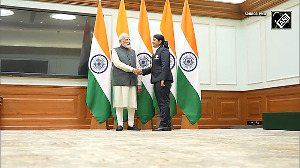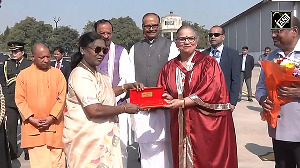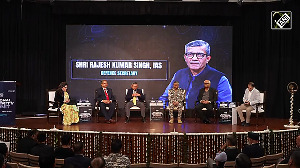In the last month of political churning, the Congress has lost some confidence and the BJP has gained some.
The combined political weight of weak and strong regional forces of India is trying to shift the centre point of power away from the Congress. A day after the second phase of polling, a major headline is about Nationalist Congress Party leader Sharad Pawar and Rashtriya Janata Dal leader Lalu Prasad Yadav explaining the importance of the Left parties in forming the next government.
The race that began some eight weeks ago had two clear political challenges. One in its attempt to retain power, the Congress was trying to emerge as the single largest party. Two, the regional and Left parties ganged up against Congress and BJP to challenge both the mainstream parties's ambitions. To the Third Front, the BJP looked weaker than the Congress when the whistle blew at the starting point.
Since the world is passing through an economic crisis, the Congress strategists justifiably felt that the electorate would like to go for stability and again opt for a government led by economist Manmohan Singh. In the last four years, till the attacks on Mumbai, the failure in managing India's internal security was perceived as the weakest point of the United Progressive Alliance government. But after the Mumbai attacks in November, the Congress played some deft politics vis-a-vis Pakistan to recover some lost ground.
Also, in the last five years, Dr Singh and Sonia Gandhi have not got embroiled in any kind of scam to give a handle to the Opposition. At the top level, the Congress party when compared to the BJP looked more cohesive. The infighting among the BJP leaders worried party cadres.
But as reports from the interiors of India started pouring in, the two popular perceptions changed.
One, Uttar Pradesh is not going into Mayawati's lap as it was popularly perceived. Two, the Left parties may not be facing the total rout as its detractors were so sure of before the election in Kerala and West Bengal. These changes are making Karat and Jaitley smile.
Equally important game changers would be the assembly election results from Orissa and Andhra Pradesh, which will have a direct impact on the formation of the government in New Delhi.
If the BJP loses very badly in both states its game is almost over. But the more BJP gains, the Third Front gains as well, says D P Tripathi of the Nationalist Congress Party.
Tripathi's argument is that even if the BJP gains in UP it doesn't bother the NCP kind of parties because they just want to ensure that a National Democratic Alliance government is not formed.
But the BJP thinking is that if in both states, the electorate gives a hung verdict (which is likely) and the Congress does not get any advantage then the BJP scores the point at least in Orissa.
As Jaitley has been saying for some weeks that if the Biju Janata Dal and the Telugu Desam Party are compelled to take the BJP's help to form the state governments in Bhubaneshwar and Hyderabad respectively, then they will gravitate towards the NDA. The BJP's strategy may work in Orissa but not so much in AP where they only had two seats and just 2.63 percent of the vote. However this time in AP, the BJP has concentrated on fewer seats and spent a fortune on it during the campaign.
The possibility of gaining some ground in the AP assembly and substantial ground in Orissa gives the BJP confidence. They think that the numbers game in forming new state governments will pave the way for the BJP to become serious contender for power in New Delhi.
Jaitley says, "If we get few seats more in UP and Congress loses as much in Andhra Pradesh then it is in trouble."
The BJP which was suffering from infighting and groping for a pan-Indian issue and seemed utterly confused in its response to the Varun Gandhi issue seems to have covered some ground thanks to turn of events in the last few weeks. Of course, these are only assumptions but there are enough clues to show that the BJP is coming closer to sit at the high table of power in New Delhi, directly or indirectly.
The Congress is top heavy and the BJP is not. The Congress does not project its regional faces well. And Sonia Gandhi, Priyanka Gandhi, Rahul Gandhi and Dr Singh combined are too stylish for voters' tastes to match against the real, earthy, regional, ethnic and foxy appeal of entire range of leaders starting from Sharad Pawar, Nitish Kumar, Mayawati, Narendra Modi to even, Raman Singh.This election seems to be monopolised by voters with a regional mindset and the sweet smiles of Priyanka Gandhi can't fill up the void.
In Haryana, AP and Delhi, the state Congress leaders charm and policies are working but in Gujarat, Maharashtra, Orissa, Tamil Nadu, West Bengal and Madhya Pradesh too many leaders are spoiling the party. The going is getting tougher for the party election after election in the absence of strong regional leaders here.
The Congress is facing the fury of the regional leaders directly and the heat is not so much on the BJP. The factor that is working well for the BJP is that the general mood of all the regional parties is directed against the Congress. In the states which are crucial for the BJP to retain its strength of 2004, it is pitted against Congress. Like MP, Rajasthan and Gujarat but in the states which are important for the Congress it is pitted against regional parties or the Left parties and strong regional leaders.
The Congress is facing the direct and intense ire of anti-Congress regional leaders. If you see what occupies media space the picture is clear. The stories of Lalu Yadav versus the Congress, TDP versus the Congress, Left parties versus the Congress and even Pawar versus the Congress have captured our attention more than Lalu Yadav hitting out against L K Advani.
The BJP is hoping that it would also gain by default as the Congress gained in 2004. And, equally important is that in some 150 Lok Sabha constituencies the party has focussed on the selective seats and select states. By spending money judiciously only on winnable seats the BJP has forced others to take them seriously.
The biggest achievement of the BJP so far is that they have not raised the pitch for Hindutva (except the unethical defence of Varun Gandhi) and even Modi is restrained. Because of it, so far, Muslim votes don't seem to have polarised against the BJP with a vengeance.
This election is more like the 'big bazaar' of different caste groups of India. Even today, the BJP doesn't have a Mayawati-like hold over any caste group like she has over the Dalits. But at a mini-micro level in each constituency where there is a triangular contest, it is trying to play the game seriously to benefit from the division of votes.
Congress allies like the Dravida Munnetra Kazhagam, the Rashtriya Janata Dal and the Lok Janshakti Party are not doing better than in 2004. The BJP's hope is that the TDP and All India Anna Dravida Munnetra Kazhagam are certainly going to fare better than 2004 and are more likely to keep away from the Congress after the election for various reasons.
The BJP was in disarray when the polls were announced. The joke was that BJP stalwarts like Rajnath Singh, Sushma Swaraj, Jaswant Singh and Murli Manohar Joshi were fighting the election to compete for the post of Leader of the Opposition in the Lok Sabha.
Of course, if at all the BJP seems to be slowly gaining ground it is largely by default.
The party had hardly played an effective role as the lead Opposition party in the last five years. Its opposition to the India-US nuclear deal was confusing and conntradictory to its core voters's thinking.
The BJP also got embroiled in infighting when controversial figures like Sudhanshu Mittal tried to get more than they deserved.
But once the election bugle was blown and the party started getting a good response from Uttar Pradesh, there is a perceptible change in its position as the challenger to the UPA. Jaitley, who is looking after the BJP's publicity, logistics and resources to keep cadres and leaders battle-fit, is ensuring that the party puts its best foot forward in the remaining phases of the election.
BJP supporters are hoping the party wins 16 to 18 seats in Gujarat (of 26); 12, 13 seats in Rajasthan (they had 21 in 2004) out of 25 while in MP they hope to retain at least 22 seats out of the 25 seats that they won in 2004. In UP they are aiming for 17, 18 and in Bihar 10 (they won 5 seats last time) and in Maharashtra 12 seats (they won 13 in 2004).
If their hopes turn true then it will inch them closer to the Congress's target. They are hoping that Chhattisgarh, Jharkhand and Uttarakhand will help them partially counter the Congress gains in Kerala, Punjab and West Bengal.
The Congress's failure in setting an agenda for any debate on its real achievement in the last five years, the absence of emotions that revolves around the secularism-communalism debate during elections, the lack of a decentralised power structure within the party, the absence of respect for its regional leadership and its arrogance to not accept the coalition ethos has given the BJP a chance to become a challenger, even though quite late, in this election.
Whether this confidence is just a spin or real will be known in less than one month but that the Congress is on the backfoot is for sure for another reason as well.
Some BJP supporters point out that the Congress has made a mistake of not going for pre-poll alliances at the national level with allies like the NCP and the RJD. It would have given them short term gains. A senior BJP leader argued that, "The Congress has made the biggest blunder by announcing Dr Manmohan Singh as the prime ministerial candidate. This untimely move by Sonia Gandhi provoked regional allies. This has brought non-Congress leaders of the UPA and non-BJP leaders in one bracket."
The BJP leader also drew an interesting scenario. "Even if for the sake of argument we claim that the Congress will become the single largest party, it is highly unlikely that the UPA will become the biggest bloc after the poll. The NDA will emerge as the single largest bloc after the election. President Pratibha Patil will have to invite the single largest pre-poll alliance and not the single largest party or the largest post-poll alliance to form the next government," he said.
However, this is a grey area.
Subhash Kashyap, the Constitutional expert, suggests that, "President Patil should declare her preference before the results are announced regarding this issue. Will she invite the single largest party, single largest pre-poll alliance or single largest post-poll alliance? She should make her choice clear to remain above controversy."
The Congress which claims it will be the single largest party in the election has no pre-poll alliance at the national level. It has only 'seat adjustments' in a few states while the NDA will claim that it has gone to polls as the single unit and should be construed as a single entity.
One is not sure what Patil will do if the BJP does not become the single largest party but the NDA becomes the single largest pre-poll alliance after the results are out.





